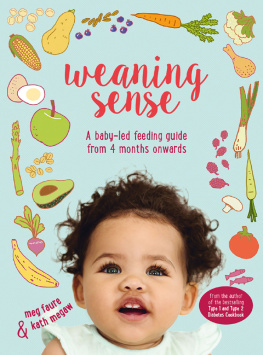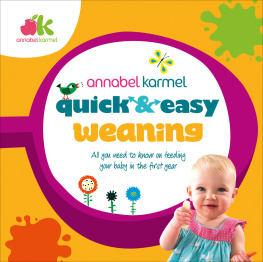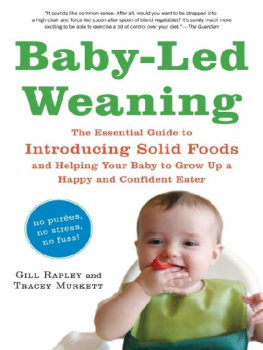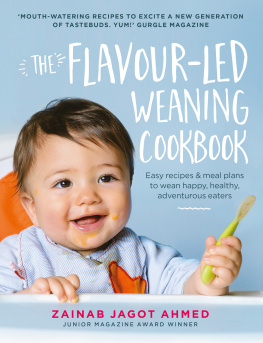

Contents


Part 1
Introduction
Baby-led weaning (BLW) is a wonderful way for your baby to share healthy family meals right from his very first taste of solid food. He will gradually discover what different foods look like and how they feel, smell and taste; he will learn how to hold them, get them to his mouth and chew them all by feeding himself at the family meal table.
This natural, commonsense approach to introducing solid foods is a hugely rewarding and enjoyable way for babies to move on to family meals. They learn to love good food and it gives them a solid foundation for healthy eating as they grow up. BLW is great for parents, too, because it takes the stress out of introducing solid foods. This book explains why it makes sense, how to get started and what to expect, and then offers delicious everyday recipes to suit the whole family.
Baby-led weaning & family mealtimes
Shared mealtimes can be among the most enjoyable experiences of being a parent and, as more and more families are finding out, the baby-led weaning approach is easier and more fun for babies and their parents than conventional weaning. Theres no need to spend time and energy preparing special pures or persuading your baby to accept food from a spoon and theres no need for mealtime battles. Instead, your baby can explore food when hes ready and go at his own pace, meaning that everyone in the family can eat together and enjoy relaxed, stress-free meals.
Its important that the food you share with your baby is as varied and nutritious as possible, so that he can experience a wide range of different flavors and textures and develop a taste for healthy eating. Thats where this book comes in. It will help you to prepare a range of dishes, quickly and easily from simple spicy beans to rice pudding made with coconut milk providing him with lots of BLW learning opportunities. All the recipes are tasty, nutritious and wholesome. They are easy to follow and quick to prepare, so theyll soon become tried-and-trusted favorites for all the family.
Baby-led weaning felt natural and easy, and it was hugely beneficial to our baby.
About this book
This book starts with an overview of what baby-led weaning is and why it appeals to so many parents (and babies). If youre new to this approach, or need a quick reminder of what it involves, youll find a guide to getting started and what to expect in the early weeks. The basics of a healthy diet are followed by some tips for supporting your babys developing skills and the golden rules of BLW. If you need more information on baby-led weaning, go to our first book, Baby-Led Weaning: The Essential Guide, which has more detail on both the reasoning behind the approach and the practicalities involved.

Family mealtimes and sharing the same food are at the heart of BLW. Babies are able to copy what everyone else is doing, feel included and enjoy learning about food in a relaxed, social way.
We know that finding time (and energy) for cooking can be a challenge when you have a baby, so all the recipes are straightforward and quick to prepare. Some take only a few minutes, while others can be done in stages. Weve also put together a dishes and snacks to make in advance, which are easy to carry without being too messy. Note: Recipes suitable for freezing are shown with this symbol  on the recipe page; those suitable for taking out are marked with
on the recipe page; those suitable for taking out are marked with  .
.
Understanding baby-led weaning
Weaning is the transition from milk-only feedings to family meals. It starts with a babys first mouthful of solid food and ends with her very last feeding of breast milk or formula. This period, during which her nourishment comes from the breast or bottle as well as family foods, takes at least six months and for a breastfed child it may last several years. BLW is a way of introducing solid foods that allows babies to progress at their own pace through this important transition. It will offer your baby the opportunity to explore food as soon as shes ready, using fingers (and, later, cutlery) to eat as much or as little as she wants, and cutting down on milk feedings in her own time. Shell join in with family mealtimes, choosing what to eat from the healthy dishes being offered, and learning as she goes by looking at, touching, smelling and tasting the food, and by copying other family members.
BLW and your growing baby
Baby-led weaning is based on the way most babies develop in their first year. By about six months, muscle strength and coordination have developed enough to enable them to sit upright, reach out and grab things they are curious about, and take them to their mouth to investigate them. They are also developing the ability to bite and chew, and their immune and digestive systems have matured enough to cope with other foods. The coming together of these different aspects of babies development curiosity, strength, coordination, digestion and immunity coincides with the gradual dwindling of their bodys stores of some micronutrients. This means that at around the same time theyre beginning to need other foods, theyre ready, able and more than willing to feed themselves with them. So, while conventional weaning has always included some finger foods from around six months, with BLW all solid foods are offered this way.
BLW is like their messy play in the beginning the amount they learn is just incredible.
Benefits of BLW
A positive learning experience
 BLW allows babies to familiarize themselves with food gradually, through looking, touching, smelling and tasting.
BLW allows babies to familiarize themselves with food gradually, through looking, touching, smelling and tasting.
 BLW helps to develop babies fine movements and hand-eye coordination.
BLW helps to develop babies fine movements and hand-eye coordination.
 BLW allows babies to learn naturally, by experimenting (the only way to discover how to hold a raspberry without squashing it is to try!).
BLW allows babies to learn naturally, by experimenting (the only way to discover how to hold a raspberry without squashing it is to try!).
 Being in control of whats happening and feeling trusted to make their own decisions encourages babies to explore and learn with confidence.
Being in control of whats happening and feeling trusted to make their own decisions encourages babies to explore and learn with confidence.
 Food offers a rich variety of learning experiences even the very best educational toys cant match it.
Food offers a rich variety of learning experiences even the very best educational toys cant match it.
Healthy outcomes
 BLW babies develop a healthy attitude to food and mealtimes. Theres no pressure to eat, so theyre free to:
BLW babies develop a healthy attitude to food and mealtimes. Theres no pressure to eat, so theyre free to:
try new foods and choose the nutrients they need
concentrate on developing new skills and learning about different foods
Next page











 on the recipe page; those suitable for taking out are marked with
on the recipe page; those suitable for taking out are marked with  .
. BLW allows babies to familiarize themselves with food gradually, through looking, touching, smelling and tasting.
BLW allows babies to familiarize themselves with food gradually, through looking, touching, smelling and tasting.